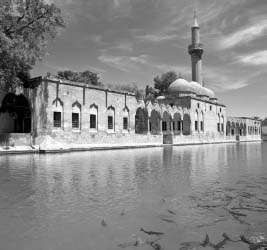IslamReligious Beliefs |
Islam is called one of the “Abrahamic” faiths—so why is Abraham important to Muslims? |
Islam’s sacred scripture, the Qur’an, makes numerous references to both biblical and extra-biblical stories about Abraham, whose Arabic name is Ibrahim. For Muslims, Ibrahim’s status is that of a Prophet, a recipient of God’s direct revelation. That he does not function as a Patriarch in Islamic tradition is significant, for Ibrahim’s primary theological role is not that of the father of a chosen nation, but that of the first “muslim”— the first human being to whom God revealed explicitly the call to be a seeker after divine unity and, therefore, the first to “surrender.” The Arabic term muslim means “one who surrenders” to God and who thereby enacts the full meaning of the term islam.
Fundamental to this aspect of Ibrahim’s Islamic role is the tradition that the prophet’s father, ‘Azar according to the Qur’an, made his living by carving idols. Though he grew up in an environment of idol worship, Ibrahim nevertheless had the spiritual gift of seeking after the one true God. He was thus the first hanif (haNEEF)— a term that was also used to describe Muhammad himself as a man driven by a spiritual quest. A lovely account (Qur’an 6:74-82) tells how God revealed his oneness to Ibrahim. One evening Ibrahim came out and beheld a star, and he said “This is my Lord.” But when the star disappeared, he said, “I love not things that set.” And when the moon rose, he took that for his Lord; but when it, too, sank from view, he sought divine protection from error. And when the sun rose, he thought this must surely be his Lord, for it was greater by far. Then even the sun set. And Ibrahim said to God, “I have surrendered” (become a muslim). Other related texts are Qur’an 19:42-49, 21:52-70, 26:69-104, 29:15-24, and 37:81-96.
Perhaps the most peculiar of all the biblical Abrahamic (Genesis 15:8-18) texts occurs in an intriguingly different version in Qur’an 2:260. In Genesis, Abraham asks God for a sign that he will indeed possess the land promised. God tells him to bring a heifer, a she-goat, a ram, a turtle dove and a pigeon. Abraham then cut the animals— all but the birds—in two and separated the pieces. In the Qur’an, the prophet wants a sign that God has the power of life. Ibrahim is instructed to take four birds, cut them into pieces and put a portion on various hills. He must then call to them and they will fly together as proof of God’s power.
Unlike the Bible, the Qur’an connects Abraham with Nimrod, whom Genesis mentions only briefly and much earlier than Abraham (Genesis 10:8-10). In Islamic lore, Nimrod functions as the Prophet’s nemesis. Qur’an 21:68-70 alludes, without naming the evil king explicitly, to Ibrahim’s conflict with the unbeliever. According to the important Islamic religious genre The Tales of the Prophets, Nimrod was to the child Ibrahim what Pharaoh would be to Moses and Herod to Jesus—a mortal enemy bent on the infant’s destruction. Failing in his earlier attempts, Nimrod managed to capture Ibrahim and catapult him into a bonfire. But there in the flames, Gabriel appeared to transform them into a pleasant garden for the prophet.
Another distinctively Islamic take on the Abraham story has to do with interpreting the tradition that God commanded the prophet to sacrifice his “firstborn son.” By Islamic reckoning, Ishmael (Isma’il in Arabic) merits that distinction, since he was indeed born before Isaac. The Qur’an does not specifically name the boy whom Ibrahim is prepared to sacrifice, but the tradition presumes, by this logic, that it was Isma’il. Jewish and Christian tradition discount the son of Hagar as illegitimate and therefore not truly Abraham’s son. The Tales of the Prophets devote considerably more attention than the Qur’an (11:72-78, 37:100-113, 51:24-34) to the individual birth stories of the two sons.
Finally, Islam’s mystical poets delight in transforming the Prophet into a paragon of mystical love. Ibrahim was a “sighful” man (awwah—the Persian expression for “sigh” is “heart-smoke”) whose heart bubbled over when he thought of God. They say you could hear his heart “bubble” for miles, so intense was his longing.

The Sacred Fish Pool in Sanliurfa, Turkey, is where it is said Abraham was thrown into a lake of fire by King Nimrod. For Muslims, Abaraham (Ibrahim) was the first person to “surrender to God.”
